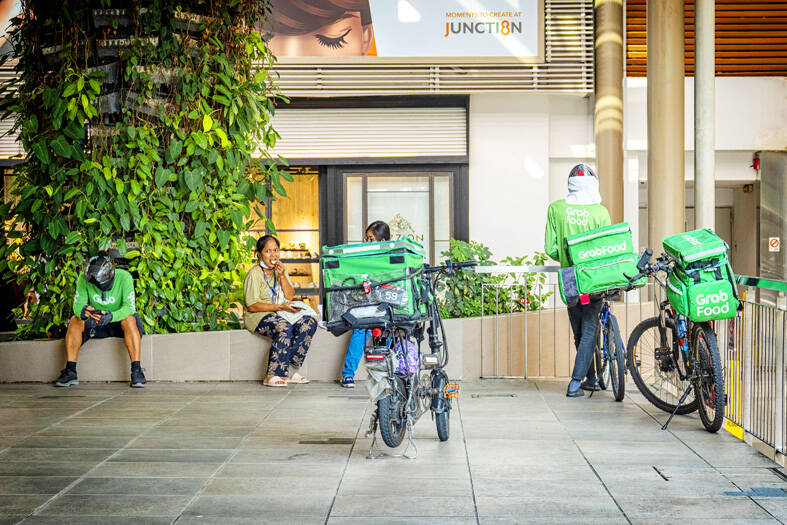Alicia quit her job at a Singapore construction firm during the COVID-19 pandemic and signed up to work for an app-based delivery company, then a ride-hailing platform. While she welcomed the flexibility, she worried about her pension, and falling sick.
She was relieved when the city-state’s government last month said it would soon introduce legislation to extend work-related injury insurance and pension coverage to delivery and ride-hailing workers from 2024 onwards.
“As a single mother, I sometimes worry about how uncertain this job can be, because I never know how much money I will make every day,” said Alicia, 43, who asked to be identified only by her first name.

Photo: Bloomberg
“So it’s good that we can get some of the benefits that other workers get. It makes me feel a bit more secure, and I can plan for the future,” Alicia, who drives for 10-12 hours a day, told news Web site Context.
Singapore is among the first Asian nations to provide legal protections for people working in the gig economy, with the new rules set to benefit about 73,000 people who deliver food or drive passengers for companies such as Grab, Gojek, Deliveroo and Foodpanda.
The step follows strikes and protests worldwide as workers demand better conditions and higher wages from app-based businesses amid a post-pandemic drop in earnings, higher living costs and a jump in fuel prices.

Photo; Reuters
Some governments have taken note.
Indian authorities have said a social security law would be extended to gig workers, although it has not yet been implemented, while Chinese regulators last year ordered online platforms to ensure workers earned above the minimum wage, and had insurance coverage.
“We are seeing more government action over platform workers’ rights and protection,” said Akkanut Wantanasombut, who researches platform work at the Institute of Asian Studies in Bangkok’s Chulalongkorn University.
“In Southeast Asia, while there is no intergovernmental mechanism like the EU to foster platform worker protection, countries like Malaysia, Singapore and Thailand have started to review their labor laws,” he said.
The so-called gig economy, where workers provide services for customers, accounts for one-third of the world’s working population by some estimates, with an increasing share through digital platforms such as ride-hailing and delivery apps.
The sector ballooned during COVID-19 lockdowns as people needed food and other goods delivered to their homes, and millions of newly jobless people looked for work.
However, many gig workers say they are forced to work long hours for low pay and few benefits.
With platforms generally classifying workers as independent contractors, half of online workers earned less than US$2 per hour, and also lacked access to traditional employment benefits such as collective bargaining, insurance and work-related injury protection, according to the International Labour Organization.
Outside Asia, governments are also putting more pressure on platform companies to provide worker protections, with the US Department of Labor in October unveiling a proposal that would make it harder for firms to treat workers as independent contractors.
The European Council — which estimates that the number of gig workers in the 27-country bloc will rise to 43 million in 2025 — this month proposed tougher rules for firms, including prohibiting algorithms from making important decisions.
The Singaporean Advisory Committee on Platform Workers was set up in September last year to look into ensuring “adequate financial protection in case of work injury,” improving housing and retirement benefits, and “enhancing representation.”
“Gig work will become ever more central in all economies ... and the sustainability of the gig marketplace comes from the appropriate protection of platform workers,” Danny Quah (柯成興), vice-chairman of the advisory committee, said in e-mailed comments.
The proposed rules would require legislative changes, and would be implemented “in a progressive manner to manage the impact on all stakeholders,” Singaporean Minister of Manpower Tan See Leng (陳詩龍) said in parliament while accepting all 12 recommendations.
For workers such as Alicia, the new rules mean app companies and drivers would need to contribute to the government’s Central Provident Fund (CPF), which helps Singaporeans pay for their housing and retirement. This is optional for workers over the age of 30.
Firms would also have to provide work injury compensation insurance — with clear definitions of when a worker is considered to be “at work” — and to allow union representation.
However, the committee recommended that platform workers should not be classified as employees, as it considers flexibility a key feature of gig work.
“It is a false dichotomy to think that flexibility draws on the absence of protection, or to suppose that without protection the gig workplace gains flexibility,” Quah said. “Instead, flexibility and protection go hand in hand.”
The Digital Platforms Industry Association, which represents Deliveroo, Grab and Foodpanda, said it “broadly welcomed” the recommendations, but “implementation would require significant work ... to ensure that it is evenly paced to minimize disruption to merchants, consumers and rider partners.”
“It will also be necessary to evaluate the overall impacts on the wider ecosystem,” a spokesperson said in an e-mail, adding that CPF contributions would likely mean lower take-home earnings for drivers and riders, and higher prices for consumers.
For Roy, a 33-year-old who drives for about four to six hours a day with Gojek, that is not a good outcome.
“It’s good to have these benefits, but what I and other drivers really need is more earnings from the platform,” he said, asking that his last name not be used.
“We already pay up to 20 percent in commission to the platform,” he said. “If we are to lose even more money, where does that leave us?”

HANDOVER POLICY: Approving the probe means that the new US administration of Donald Trump is likely to have the option to impose trade restrictions on China US President Joe Biden’s administration is set to initiate a trade investigation into Chinese semiconductors in the coming days as part of a push to reduce reliance on a technology that US officials believe poses national security risks. The probe could result in tariffs or other measures to restrict imports on older-model semiconductors and the products containing them, including medical devices, vehicles, smartphones and weaponry, people familiar with the matter said. The investigation examining so-called foundational chips could take months to conclude, meaning that any reaction to the findings would be left to the discretion of US president-elect Donald Trump’s incoming team. Biden

INVESTMENT: Jun Seki, chief strategy officer for Hon Hai’s EV arm, and his team are currently in talks in France with Renault, Nissan’s 36 percent shareholder Hon Hai Precision Industry Co (鴻海精密), the iPhone maker known as Foxconn Technology Group (富士康科技集團) internationally, is in talks with Nissan Motor Co’s biggest shareholder Renault SA about its willingness to sell its shares in the Japanese automaker, the Central News Agency (CNA) said, citing people it did not identify. Nissan and fellow Japanese automaker, Honda Motor Co, are exploring a merger that would create a rival to Toyota Motor Corp in Japan and better position the combined company to face competitive challenges around the world, people familiar with the matter said on Wednesday. However, one potential spanner in the works is

HON HAI LURKS: The ‘Nikkei’ reported that Foxconn’s interest in Nissan accelerated the Honda-merger effort out of fears it might be taken over by the Taiwanese firm Nissan Motor Co has become the latest buyout target in Japan as it explores a merger with Honda Motor Co and faces an overture from Hon Hai Precision Industry Co (鴻海精密), known as Foxconn Technology Group (富士康科技集團) internationally. Shares in Nissan yesterday jumped 24 percent, the most on record, to hit the daily limit, after the two Japanese automakers acknowledged that talks are ongoing to better position themselves for competitive challenges during a time of upheaval in the global auto industry. Foxconn — a Taipei-based manufacturer of iPhones, which has been investing heavily in factories to build electric vehicles — has also

CHIP SUBSIDY: The US funding would help alleviate the financial pressure from building two fabs in the US and should lift gross margins in 2026, the company said GlobalWafers Co (環球晶圓), the world’s third-largest silicon wafer supplier, yesterday said it is to receive US$406 million in subsidies from the US Department of Commerce for two new US fabs under the CHIPS and Science Act, with the first batch of the funds likely coming next year. The grant represents 10 percent of the planned investments of US$4 billion in advanced semiconductor wafer manufacturing facilities in Texas and Missouri, GlobalWafers said. The commerce department is to disburse the funds based on the completion of project milestones over a multiyear timeframe, the company said. Along with the tax credit, which is equal to